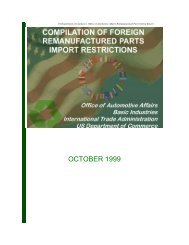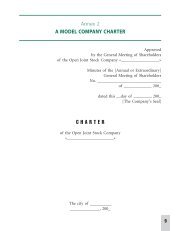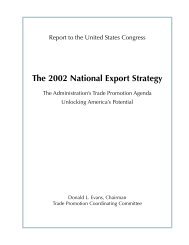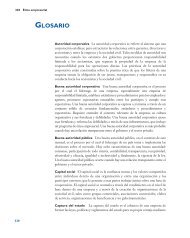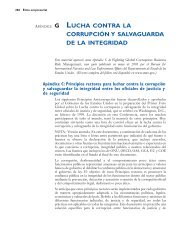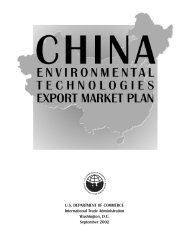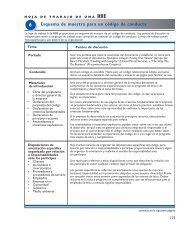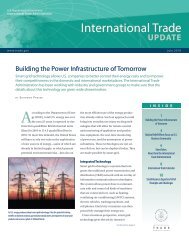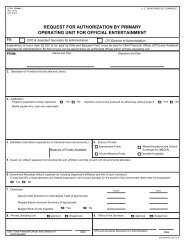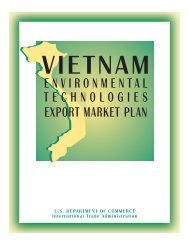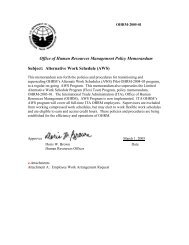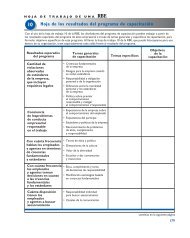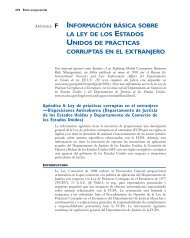Global Steel Trade; Structural Problems and Future Solutions
Global Steel Trade; Structural Problems and Future Solutions
Global Steel Trade; Structural Problems and Future Solutions
Create successful ePaper yourself
Turn your PDF publications into a flip-book with our unique Google optimized e-Paper software.
• Reinvigorate the international steel policy agenda.<br />
- Make the Organization for Economic Cooperation <strong>and</strong> Development (OECD) <strong>Steel</strong> Committee a<br />
viable forum for real progress.<br />
- Restrict government <strong>and</strong> multilateral development bank lending to exp<strong>and</strong> steel capacity.<br />
• Promote more market-oriented financial systems, including in major steel-producing countries, through<br />
complementary measures.<br />
Maintain Strong, WTO-Consistent U.S. <strong>Trade</strong> Laws<br />
Recognizing the need to maintain effective trade remedies, the Administration firmly opposed all efforts to<br />
reopen the Antidumping Agreement during the WTO Ministerial in Seattle. The United States tabled a<br />
proposal to strengthen implementation efforts by the existing WTO Antidumping <strong>and</strong> Subsidies <strong>and</strong><br />
Countervailing Measures Committees <strong>and</strong> to discuss certain implementation issues raised by developing<br />
countries regarding the existing agreements. Maintaining strong U.S. trade laws continues to be one of our<br />
highest priorities for a new round of negotiations.<br />
The Administration also negotiated strong terms on antidumping <strong>and</strong> subsidies in the agreement regarding<br />
China’s accession to the WTO. Under the terms of the U.S.-China bilateral agreement signed in November<br />
1999, China has committed to important disciplines on subsidies <strong>and</strong> agreed to guarantee our right to<br />
continue using our current antidumping methodology (treating China as a nonmarket economy in<br />
antidumping cases for fifteen years after China’s accession to the WTO).<br />
Challenges to U.S. trade laws in WTO dispute settlement proceedings have been increasing. Japan has<br />
recently formed a special task force within its Ministry of International <strong>Trade</strong> <strong>and</strong> Industry to bring WTO<br />
challenges against trade remedy rulings made against Japan by the United States. In response, the<br />
Administration is strengthening its resources to forcefully defend U.S. trade laws in WTO dispute<br />
settlement litigation. The Commerce Department has increased personnel dedicated to WTO litigation<br />
support in the Department’s Import Administration <strong>and</strong> Office of the Chief Counsel. Funding is also being<br />
sought in the Administration’s budget request for FY 2001 to increase WTO litigation resources within the<br />
Office of the U.S. <strong>Trade</strong> Representative (USTR) <strong>and</strong> the Commerce Department.<br />
Provide Early Warning of Import Surges<br />
<strong>and</strong> Industry Conditions<br />
Early Release of <strong>Steel</strong> <strong>Trade</strong> Statistics<br />
The Commerce Department’s Bureau of the Census will issue steel import statistics on an expedited schedule<br />
(approximately one month early) at least through January 2002. The Bureau of the Census will also exp<strong>and</strong> the list<br />
of products for the early release of statistics to include certain steel inputs <strong>and</strong> certain additional steel products.<br />
These actions are an extension of the commitment made in the President’s <strong>Steel</strong> Action Program to continue<br />
the early release of steel import statistics through December 2000. Domestic steel producers, steel workers,<br />
trading companies, <strong>and</strong> steel service center operators have indicated that the early release of steel statistics<br />
by the Census Bureau significantly enhanced market stability by allowing market participants to better<br />
assess market conditions. The early release of trade statistics also allows more rapid responses by<br />
government policymakers.<br />
Monitor Industry Trends<br />
Our experience in responding to the steel crisis <strong>and</strong> our consultations with steel industry representatives<br />
have highlighted the need for an early warning system for any potential future crisis. Accordingly, we<br />
174 <strong>Global</strong> <strong>Steel</strong> <strong>Trade</strong>: <strong>Structural</strong> <strong>Problems</strong> <strong>and</strong> <strong>Future</strong> <strong>Solutions</strong>



